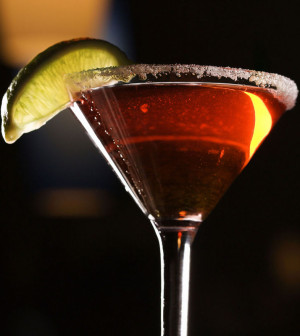- Double Mastectomy May Offer No Survival Benefit to Women With Breast Cancer
- Toxic Lead Found in Cinnamon Product, FDA Says
- Certain Abbott Blood Sugar Monitors May Give Incorrect Readings
- Athletes Can Expect High Ozone, Pollen Counts for Paris Olympics
- Fake Oxycontin Pills Widespread and Potentially Deadly: Report
- Shingles Vaccine Could Lower Dementia Risk
- Your Odds for Accidental Gun Death Rise Greatly in Certain States
- Kids From Poorer Families Less Likely to Survive Cancer
- Tough Workouts Won’t Trigger Cardiac Arrest in Folks With Long QT Syndrome
- At-Home Colon Cancer Test Can Save Lives
1 in 10 Deaths Among Adults Tied to Alcohol: CDC


One in 10 deaths among U.S. adults is linked to excessive alcohol consumption, federal officials reported Thursday.
While people often link drinking with deaths from motor vehicle accidents and chronic liver disease, many other conditions that can cause death are tied to alcohol, said lead researcher Mandy Stahre.
“Excessive drinking is associated with a lot more causes of death than what we tend to focus on. Alcohol intake plays a role in at least 54 different conditions linked to death,” said Stahre, an epidemiologist at the Washington state Department of Health who conducted the study while at the U.S. Centers for Disease Control and Prevention.
Among them: acute pancreatitis, psychosis, esophageal cancer, breast cancer, oral cancer, falling injuries, suicide and drowning.
“Binge drinking is associated with 51 percent of all deaths due to excessive drinking,” Stahre said. Binge drinking, for instance, “does not mix well with swimming or boating,” she said.
For women, binge drinking is typically defined as four or more drinks in a sitting, Stahre said, while for men it’s five or more.
The finding is published in the June issue of the journal Preventing Chronic Disease. While the study found an association between alcohol use and the deaths of many U.S. adults, it wasn’t designed to prove that alcohol directly caused those deaths.
To arrive at the finding, researchers used a tool known as the Alcohol-Related Disease Impact application to estimate which deaths were due to alcohol, and to look at how the numbers differed among states. The study estimated the number of deaths attributed to alcohol per year in the United States from 2006 through 2010.
Stahre’s team also estimated years of potential life lost, finding that excessive drinking shortened the lives of those who died by about 30 years. During the five-year study period, as many as 2.5 million potential years of living may have been cut short due to alcohol use, the study found.
Males were involved in most of the alcohol-related deaths — 71 percent.
“They are more likely to engage in excessive drinking,” Stahre said.
The number of deaths due to alcohol varied greatly by state. For instance, New Mexico had 51 deaths annually per 100,000 people, while New Jersey had 19 per 100,000. The difference may be explained by many factors, such as religious beliefs, state policies on selling alcohol, differences in drinking patterns and differences in access to health care, including emergency departments, Stahre noted.
The findings come as no surprise, said Dr. James Garbutt, a professor of psychiatry and a research scientist at the Bowles Center for Alcohol Studies at the University of North Carolina at Chapel Hill.
The study points out that ”one doesn’t have to be an alcoholic to experience the negative consequences of alcohol,” said Garbutt.
“Alcohol isn’t totally benign,” Garbutt said. “Moderation is very important.”
He added that taking one’s personal health history into account before deciding whether to drink alcohol is crucial. For instance, he said, “If you are a woman with a breast cancer history in the family, you may want to think even more about what role alcohol should have in your life.”
More information
To learn more about alcohol abuse, visit the University of North Carolina.
Source: HealthDay
Copyright © 2024 HealthDay. All rights reserved.










